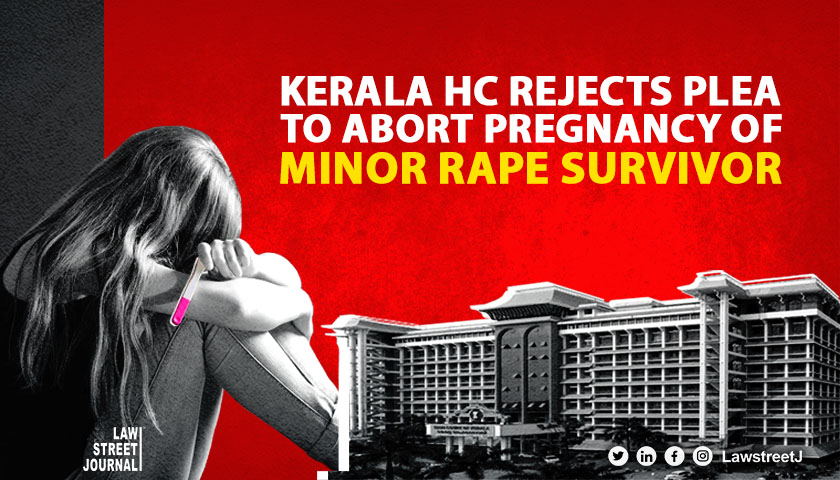In a significant case, the Kerala High Court declined to authorize the abortion of a 30-week pregnancy borne by a 14-year-old rape survivor despite it being a case of "statutory rape under the provisions of the Protection of the Children from Sexual Offences Act, 2012.
I am, therefore, of the firm view that this is not a case where the provisions of 'the Act' can come to the aid of the petitioner, though she and her daughter ought to be offered every protection available in law, to ensure that the latter delivers her baby and is able to take care of her, within the parameters of the statutory and executive realm, Justice Devan Ramachandran said.
The Court was hearing the plea seeking the medical termination of pregnancy of a 14-year-old rape survivor; the girl was sexually assaulted by the accused who is now in custody under the POCSO Act.
At the outset, the Court noted that there were two lives at stake one, that of the minor child who is continuing with the pregnancy, and that of the foetus, which, according to the uncontested Medical Report, is at 30 weeks of gestation with a good foetal heart.
The Court also noted that the matter was heard at least thrice and three different interim orders were passed in the matter.
When the matter was taken up for hearing on December 1, the Government Pleader Vidya Kuriakose, submitted that all necessary measures had been taken to ensure that the child is brought back to her home, to be in the company and comfort of her parents, so that she can continue with the pregnancy and deliver the child without mental strain or stress.
She added that the victim child has, in fact, had been brought to her home and every possible measure is being taken in accordance with the courts interim order dated November 23, 2023 to keep her safe and away from harm.
Advocate M Kabani Dinesh, appearing for the petitioner, submitted that since the pregnancy was the outcome of an act of rape on her client's child, she is entitled to the protection of the Medical Termination of Pregnancy Act, 1971.
After analysing the arguments at hand, the Court took note of the twist here, i.e., as the records stated that the victim child had not been forced. However, this too would come under the ambit of statutory rape under the POCSO Act, the Bench agreed.
Since the pregnancy is now very advanced, as per the Medical Board, the uterus corresponded to 30 weeks of gestation with good foetal heart. The foetus has, in fact, life with heart rate; and hence, termination of the pregnancy at this stage is impossible, as also untenable, the Courts order recorded.
The Medical Board is also unambiguously of the view, as available from the record, that termination is not possible, but that the baby can only be taken out through a Caesarean section - which is to say, that it will be born alive, with a prognosis of a good life in future, the Court noted.
The Court further indicated that there werent any risks associated with the victim child's health nor were there any lethal foetal abnormalities detected. The pregnancy is almost in its 9th month and the foetus is gaining weight and fat, getting closer to its eventual birth weight. Its vital organs, like the brain and lungs, are almost fully developed, preparing for life outside the womb, the Court stated.
And so, the Court cant grant the petitioners prayer despite being fully empathetic with the condition she and her family is going through, since the victim child is so young.
While closing the writ petition, the Court also directed the jurisdictional Child Protection Officer to visit the victim child on a regular basis and offer all kinds of support for continuing the pregnancy and the delivery. The officer was also directed to contact the Doctors and other professionals for the delivery. In case of any issue, the Court also directed the petitioners to move the Court seeking relief.
Needless to say, the liberty of the petitioner and her daughter to approach the competent Court under the provisions of the Juvenile Justice Act, or such other applicable laws, with respect to the child to be born, is left open; and they will also be given adequate assistance and counselling in this regard by the Child Protection Officer.







![Kerala HC Quashes 498A Dowry Harassment Case Against Live-In Partner, Citing Lack of Relative Status [Read Order]](/secure/uploads/2023/08/lj_5693_1057c042-1e57-4e27-8c9e-25af0ec38ec4.jpg)
![Watching porn on mobile: Kerala HC highlights importance of mother cooked meals, outdoor sports [Read Order]](/secure/uploads/2023/09/lj_9155_Parental_supervision_of_mobile_phone_usage.jpg)
![Lakshadweep MP Mohammed Faizal Disqualified from Lok Sabha After Conviction Suspension Plea Rejected by Kerala High Court [Read Notice]](/secure/uploads/2023/10/lj_9640_87b5fd97-0e05-4ff8-9a99-3be1e4446192.jpg)






